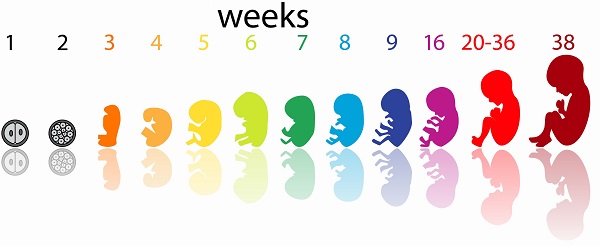17 Feb Call in the Reinforcements
I think of learning like photography. The length of time of the exposure and the width of the aperture determine whether the film or digital array receives sufficient light to capture the image. The focus of the lens is important too. As adults, we can sometimes control the number of times we return to a learning opportunity and the quality of the focus while we are engaged. In prenatal and early child development, everything depends on the environment provided by the mom. For language learning, my particular interest, the whole village contributes.
 Prenatal Reinforcement
Prenatal Reinforcement
Each time mom takes her morning ride, Yorrick’s memory of these perceived stimuli is reinforced. Though the fragments of perception that he is able to distinguish are stored in his brain in amorphic clusters of recognition patterns, these milk-and-bread stimuli give his cognitive apparatus its first workouts. The daily exercises in simple learning naturally affect the parts of Yorrick’s brain that form earliest because most of his brain is still growing neurons at an incredibly rapid rate. He probably already has a sense of smell, but because of the lack of changes in olfactory input stimuli, he probably doesn’t learn much about smells or his ability to smell. But if there is aromatic variety in the amnionic fluid, Yorrick is likely able to detect it early on.
Whether his brain can do more than register an in-utero aroma is questionable. He certainly can’t associate it with other aromas, but he can file it in his aroma memory, and I think it is possible, when he detects the same aroma post-partum, learning about it and associating it may be a bit easier than for aromas he encounters for the first time.
| Understanding Context Cross-Reference |
|---|
| Click on these Links to other posts and glossary/bibliography references |
|
|
|
The sequence of development of Yorrick’s sensory abilities is well-documented. The fact that his brain is in the early stages of development suggests that his learning and remembering capabilities are limited. To suggest, however, that his brain does not begin to function until some time much later than his sensory apparatus begins to function is unreasonable. A prerequisite for learning in such a stimulus-starved environment is frequent repetition of identifiably similar stimuli.
 The olfactory sense is critical to survival for many animals. They use smell to hunt and to detect the presence of predators. Yorrick will probably not need his nose for hunting or self defense. The lack of development of the human olfactory sense can be explained in the context of natural selection – the homo sapiens who used their brains more than their noses survived while those who relied on their noses did not. The parts of the brain handling olfactory stimuli are evolutionarily more primitive than those specialized for seeing and hearing.
The olfactory sense is critical to survival for many animals. They use smell to hunt and to detect the presence of predators. Yorrick will probably not need his nose for hunting or self defense. The lack of development of the human olfactory sense can be explained in the context of natural selection – the homo sapiens who used their brains more than their noses survived while those who relied on their noses did not. The parts of the brain handling olfactory stimuli are evolutionarily more primitive than those specialized for seeing and hearing.
As his sense of hearing develops more fully and as the environmental stimuli that activate his hearing are probably more profound and diverse than other stimuli, Yorrick attends to sounds with more energy. The only sound signatures that are consistent enough for him to remember, however, are the hoof-fall rhythm and mom’s voice. These sounds are naturally associated with everything he knows, all of which happens to be good.
 Yīn and Yáng
Yīn and Yáng
The dichotomy between GOOD and BAD will not become part of Yorrick’s conscious repertoire or knowledge base until he experiences enough distress to learn the difference. Distress will then equate to feeling bad, and the absence of distress will equate to feeling good. This dichotomy will later become a fundamental conscious phenomenon that motivates Yorrick to act. He will learn to make decisions based on concrete and abstract ideas that are inextricably linked to this primitive phenomenon of discriminating between feeling good and feeling bad.
Ancient oriental philosophy treats both the GOOD and BAD as essential components of life and growth. Their coexistence is necessary for us to comprehend anything important. {Unrelated aside: Notice the simplification in the right radical of the newer simplified Chinese characters to moon and sun. Modern western philosophy and politics could benefit from more enlightened perspectives on the necessary coexistence of Yīn and Yang.}
Case for Prenatal Learning
Fetuses respond to certain foods consumed by the mother. The foods may cause certain by-products to be transferred through the umbilical fluid to the baby, or the mother’s response to the food may indirectly affect the fetus. Besides empirical observations of how fetuses respond to these types of stimuli, there is significant evidence that other things are learned in-utero.
For example, there is amazing evidence that identical twins have innate similarities. Studies of identical twins who were separated at birth, most of whom did not meet each other prior to their evaluations at the University of Minnesota, show they have uncanny parallels in habits, preferences, and other personality traits. The frequency and profundity of these similarities in personality characteristics and habitual quirks suggest that they were not coincidentally learned after birth but are somehow innate.
Chomsky and other innatists describe the process of language acquisition “exclusively as the development within the individual of a linguistic competence, a tacit knowledge of rules which enables the individual to generate utterances which are put together for the first and only time” (Cook ’93). This description, while important in understanding the origins of utterances that are neither based on rote memory nor repetitions, emphasizes the creativity of language, while ignoring the mechanisms of learning.
 The influence of prenatal conscious phenomena may be much greater than previously thought. In other words, the fetus may be capable of learning tremendous numbers of patterns while in-utero. These learned patterns, though vague, appear to profoundly influence human development. Call in the reinforcements through repetition of the helpful patterns.
The influence of prenatal conscious phenomena may be much greater than previously thought. In other words, the fetus may be capable of learning tremendous numbers of patterns while in-utero. These learned patterns, though vague, appear to profoundly influence human development. Call in the reinforcements through repetition of the helpful patterns.
What if Yorrick’s mother had taken drugs while she was pregnant with him? If Yorrick had had the misfortune of feeling bad in-utero (for example through the impact of narcotics), he may well have come into the world with an impaired ability to learn.
| Click below to look in each Understanding Context section |
|---|








